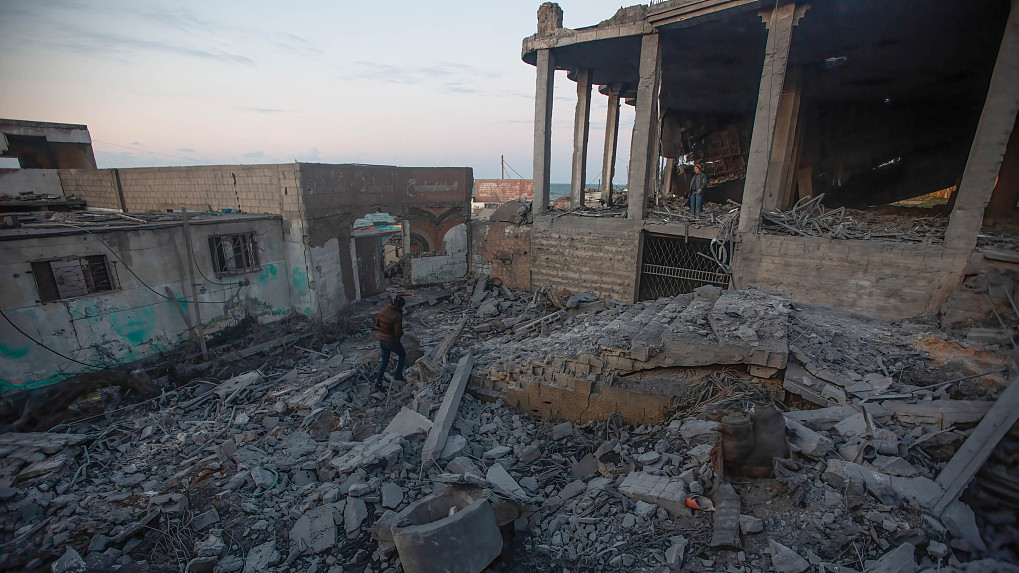
A destroyed wedding hall after attacks by Israeli aircraft in Gaza, February 13, 2023. /CFP
A destroyed wedding hall after attacks by Israeli aircraft in Gaza, February 13, 2023. /CFP
Editor's note: Hannan Hussain is a foreign affairs commentator, author and assistant research associate at the Islamabad Policy Research Institute. The article reflects the author's opinions and not necessarily the views of CGTN.
On April 17, Chinese State Councilor and Foreign Minister Qin Gang held a phone call with Israeli Foreign Minister Eli Cohen, communicating China's willingness to facilitate Israel-Palestinian peace talks to "prevent the conflict from escalating or even getting out of control."
Beijing's support for resumption of dialogue arrives at a critical juncture. Heightened tensions between Israel and Palestine have contributed to new spikes in violence, adding more uncertainty to a conflict that witnessed its deadliest spell last year. Renewed fears of escalation make it critical to bridge trust deficits, and credibly steer talks towards a two-state solution. "The fundamental way out is to resume peace talks and implement the two-state solution," said Qin. "It is never too late to do the right thing."
Several factors underscore China's potential to serve as an effective mediator in one of the Middle East's most consequential conflicts to date.
First, China has spent years maintaining healthy diplomatic proximities to both parties, creating valuable common ground to project its neutrality and coordinate expectations for peace. It has also maintained staunch advocacy for Palestine's UN-designated right to independent statehood, while employing a "common security" lens to support a negotiated outcome to the Israel-Palestine question. Qin's principled stance can lay the groundwork for buffer periods ahead of possible negotiations since the path to enduring peace runs through de-escalation and restraint.

A fire in the courtyard of Al-Aqsa Mosque in East Jerusalem, April 22, 2022. /CFP
A fire in the courtyard of Al-Aqsa Mosque in East Jerusalem, April 22, 2022. /CFP
Another strong point is China's treatment of the historic conflict as a central determinant of Middle Eastern peace at large. For years, China has called out deviations from the original Middle East peace plan to refocus attention on relevant UN Security Council (UNSC) resolutions, furthering the case for more inclusive pathways to rebuilding Israel-Palestinian confidence.
On April 17, Qin also had a telephonic exchange with the Palestinian Minister of Foreign Affairs and Expatriates Riyadh al-Maliki, where he said that China is highly concerned about the recent escalation of conflict and tension between Palestine and Israel, and has promoted consultations at the UNSC and maintained close communication with the international community to cool down the situation. One common thread that accompanies China's present international activism is that passive mediation on the Israel-Palestinian conflict is not an option.
Instead, Beijing's Global Security Initiative (GSI) – a key reference point in Qin's exchange with Cohen – suggests a more proactive approach to incentivizing talks, especially when momentum has been lost for more than a decade. The GSI promotes "common security" for all, while calling for the legitimate security concerns of all to be respected and taken seriously.
For decades, the United States positioned itself as a major peace-broker between Israel and Palestine. But dwindling traction with key Arab countries dampened enthusiasm for its "two-state" promise, and left little to show for collective progress. Keeping those constraints in mind, China's mediation potential deserves to be seen in a different light.
It is a fact that China continues to enjoy very strong relations with key Arab states with a deep stake in the Israel-Palestine conflict. That includes Saudi Arabia, the Organization of Islamic Cooperation as well as the Arab League, which has championed elements of a two-state solution that are consistent with China's own priorities.
Now as Palestine and Israel make it clear that they value China's influence and welcome its positive role, there is significant optimism about China's potential to cultivate trust surplus and mediate effectively for lasting peace in the region.
(If you want to contribute and have specific expertise, please contact us at opinions@cgtn.com. Follow @thouse_opinions on Twitter to discover the latest commentaries on CGTN Opinion Section.)